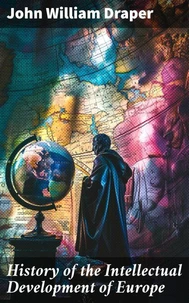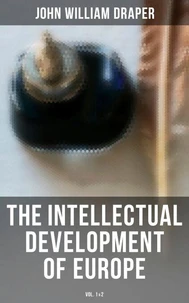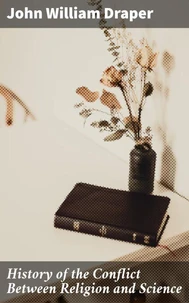History of the Conflict Between Religion and Science
Par :Formats :
Disponible dans votre compte client Decitre ou Furet du Nord dès validation de votre commande. Le format ePub est :
- Compatible avec une lecture sur My Vivlio (smartphone, tablette, ordinateur)
- Compatible avec une lecture sur liseuses Vivlio
- Pour les liseuses autres que Vivlio, vous devez utiliser le logiciel Adobe Digital Edition. Non compatible avec la lecture sur les liseuses Kindle, Remarkable et Sony
 , qui est-ce ?
, qui est-ce ?Notre partenaire de plateforme de lecture numérique où vous retrouverez l'ensemble de vos ebooks gratuitement
Pour en savoir plus sur nos ebooks, consultez notre aide en ligne ici
- Nombre de pages287
- FormatePub
- ISBN859-65--4734278-6
- EAN8596547342786
- Date de parution15/09/2022
- Protection num.Digital Watermarking
- Taille518 Ko
- Infos supplémentairesepub
- ÉditeurDIGICAT
Résumé
In "History of the Conflict Between Religion and Science, " John William Draper constructs a compelling narrative that meticulously examines the historical tensions between religious doctrines and scientific advancements. Draper's scholarly prose weaves together an analysis of critical moments in history, from the trials of Galileo to the more contemporary debates over evolution, employing a vigorous dialectical style that effectively engages with both historical events and philosophical implications.
Rooted in the burgeoning context of the scientific revolution and the Enlightenment, Draper argues for the necessity of separating empirical inquiry from dogmatic belief, illustrating how science has often been at odds with established religious views. John William Draper, an accomplished scientist and historian, was deeply influenced by the tumultuous intellectual atmosphere of the 19th century, a period marked by rapid scientific discoveries and evolving religious paradigms.
His background in chemistry and his role at the forefront of scientific inquiry inspired him to explore the complex relationship between faith and reason. Draper's work not only reflects his commitment to rationalism but also highlights the broader Victorian struggle to reconcile these two pivotal aspects of human thought. This book is essential reading for anyone interested in the historical interplay between science and religion.
Draper's incisive analysis invites readers to reflect on timeless questions of belief, doubt, and the pursuit of knowledge. It serves as a crucial reminder of the importance of skepticism and inquiry in a world that often oscillates between faith and empiricism.
Rooted in the burgeoning context of the scientific revolution and the Enlightenment, Draper argues for the necessity of separating empirical inquiry from dogmatic belief, illustrating how science has often been at odds with established religious views. John William Draper, an accomplished scientist and historian, was deeply influenced by the tumultuous intellectual atmosphere of the 19th century, a period marked by rapid scientific discoveries and evolving religious paradigms.
His background in chemistry and his role at the forefront of scientific inquiry inspired him to explore the complex relationship between faith and reason. Draper's work not only reflects his commitment to rationalism but also highlights the broader Victorian struggle to reconcile these two pivotal aspects of human thought. This book is essential reading for anyone interested in the historical interplay between science and religion.
Draper's incisive analysis invites readers to reflect on timeless questions of belief, doubt, and the pursuit of knowledge. It serves as a crucial reminder of the importance of skepticism and inquiry in a world that often oscillates between faith and empiricism.
In "History of the Conflict Between Religion and Science, " John William Draper constructs a compelling narrative that meticulously examines the historical tensions between religious doctrines and scientific advancements. Draper's scholarly prose weaves together an analysis of critical moments in history, from the trials of Galileo to the more contemporary debates over evolution, employing a vigorous dialectical style that effectively engages with both historical events and philosophical implications.
Rooted in the burgeoning context of the scientific revolution and the Enlightenment, Draper argues for the necessity of separating empirical inquiry from dogmatic belief, illustrating how science has often been at odds with established religious views. John William Draper, an accomplished scientist and historian, was deeply influenced by the tumultuous intellectual atmosphere of the 19th century, a period marked by rapid scientific discoveries and evolving religious paradigms.
His background in chemistry and his role at the forefront of scientific inquiry inspired him to explore the complex relationship between faith and reason. Draper's work not only reflects his commitment to rationalism but also highlights the broader Victorian struggle to reconcile these two pivotal aspects of human thought. This book is essential reading for anyone interested in the historical interplay between science and religion.
Draper's incisive analysis invites readers to reflect on timeless questions of belief, doubt, and the pursuit of knowledge. It serves as a crucial reminder of the importance of skepticism and inquiry in a world that often oscillates between faith and empiricism.
Rooted in the burgeoning context of the scientific revolution and the Enlightenment, Draper argues for the necessity of separating empirical inquiry from dogmatic belief, illustrating how science has often been at odds with established religious views. John William Draper, an accomplished scientist and historian, was deeply influenced by the tumultuous intellectual atmosphere of the 19th century, a period marked by rapid scientific discoveries and evolving religious paradigms.
His background in chemistry and his role at the forefront of scientific inquiry inspired him to explore the complex relationship between faith and reason. Draper's work not only reflects his commitment to rationalism but also highlights the broader Victorian struggle to reconcile these two pivotal aspects of human thought. This book is essential reading for anyone interested in the historical interplay between science and religion.
Draper's incisive analysis invites readers to reflect on timeless questions of belief, doubt, and the pursuit of knowledge. It serves as a crucial reminder of the importance of skepticism and inquiry in a world that often oscillates between faith and empiricism.





